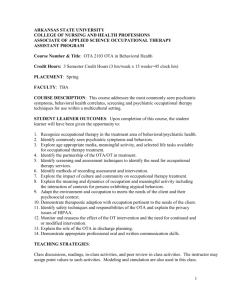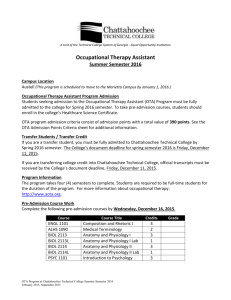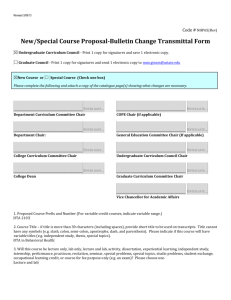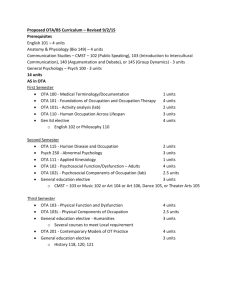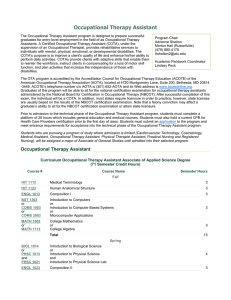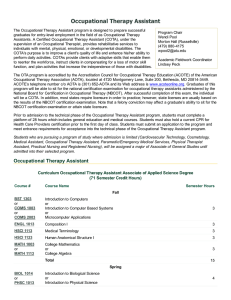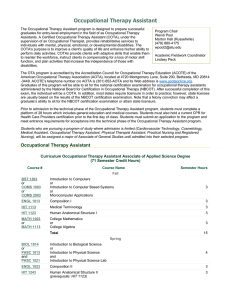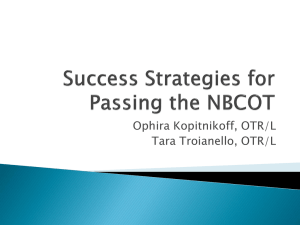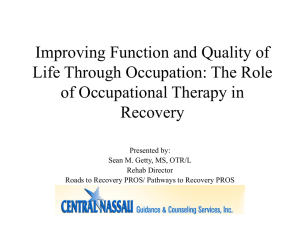policies
advertisement
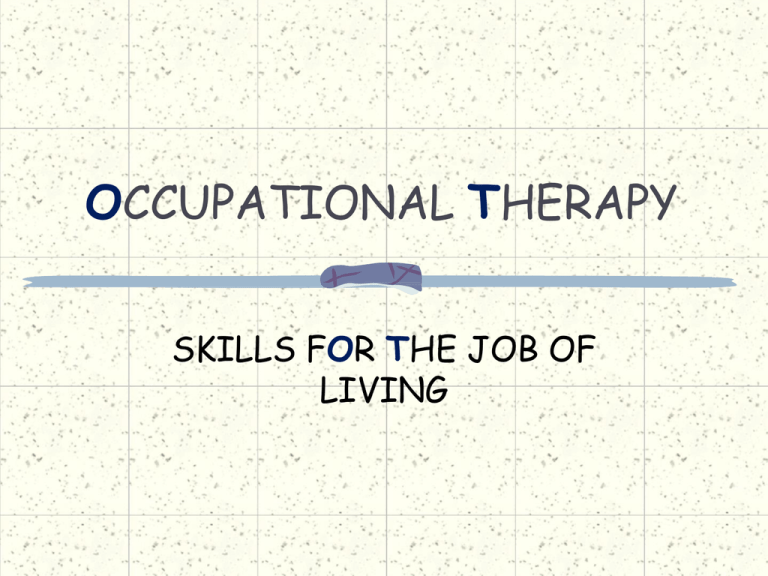
OCCUPATIONAL THERAPY SKILLS FOR THE JOB OF LIVING Introduction of students Why Occupational Therapy Assistant? Definition of Occupational Therapy Restoration and development of a person’s occupation (daily routines, activities and social roles) OT helps people fulfill their roles and responsibilities as student, worker, friend, parent, significant other OT uses work, play, and self care OT helps people achieve independence OT helps people live productive and satisfying lives Films on Demand http://www.witc.edu/pgmpages/ota/a dmissions.htm Can be seen from any WITC campus 22 minutes Overview of what the OTA does OT Practitioners COTA Certified Occupational Therapy Assistant Associate’s Degree Work under the supervision of the Registered Occupational Therapist OTR Registered Occupational Therapist Entry Level Master’s Degree What diagnoses can be treated by Occupational Therapy? Heart attack or stroke Arthritis, multiple sclerosis and other degenerative diseases Children with birth defects, learning difficulties or developmental disabilities Mental health issues such as depression, schizophrenia or bi-polar disorder Substance abuse issues and eating disorders Burns, spinal cord injuries or amputations Broken bones or injuries from falls, sports or accidents Work related or age related injuries Low vision Cognitive deficits such as brain injury or Alzheimer’s Disease Health promotion or wellness Where do OT Practitioners work? Hospitals Rehabilitation Centers Skilled Nursing Facilities School systems Home health agencies Community programs Early intervention programs Residential facilities Hospice Volunteer agencies Private practice Work hardening Day programs Assisted living Sheltered workshops Hand therapy Description of OT—Faculty Perspective • Laura Schulte • Pediatrics, Mental Health • Barb Kloetzke • Assistive Technology, Geriatric Practice • Physical Rehabilitation • Mari Jo Ulrich 2 areas of employment • Traditional • COTA • Under supervision of OTR • Provide OT services • Hospital, School, SNF Emerging or Nontraditional • No OTR needed • Using skills from this degree in work setting OT Practitioners Must pass a national certification exam to practice (NBCOT) Must attain state licensure to practice Must have a background check What attracts students to OTA? Chance for direct service career Diverse opportunities for employment Possible progression to OTR Fieldwork and practical based curricula Working directly with people What attributes should an occupational therapy assistant have? Creativity Flexibility Desire to work with people Patience Warmth Data NBCOT The National Board for Certification in Occupational Therapy, Inc. (NBCOT) Credentialing agency that provides certification for the occupational therapy profession NBCOT serves the public interest by developing, administering, and continually reviewing a certification process NBCOT Prometric Test Centers Online testing 200 Multiple Choice questions 4 hours $500.00 online application $540.00 paper application NBCOT Results 2012 National Data 2010 Occupational Therapy Compensation and Workforce Study, AOTA Primary Work Settings 2010 Occupational Therapy Compensation and Workforce Survey Annual Salary Median 0-1 year Experience •$34, 298 1.1-2 years Experience •$41,000 Wisconsin Average •$37,000 2010 Occupational Therapy Compensation and Workforce Survey General Information General Information Calendar Campus Contacts Student Biographical Change Request Student information sheet Admission Admission Attend OTA orientation High School Chemistry or College Chemistry as a pre-req to General A and P Complete Criminal Background Check Physical exam Immunization Record Admission View Films on Demand from WITC campus Occupational Therapy Assistant Curriculum Plan • Approx costs Curriculum Plan Curriculum Checklist E1 Must take all 514 courses at one time Must be successful in all 514 courses each semester to progress to the next semester Anatomy and Physiology is a pre-req for 2nd semester of the OTA program 3 Year Plan Some students take General Studies courses prior to 514 (core) courses Fieldwork • Reliable transportation needed Fieldwork I is 3rd semester • One day per week off campus (6 hours) • May be up to 2 hours from your campus Fieldwork II 4th semester Full time (35-40+ hours per week) 2 different 8-week rotations Training and supervision provided by therapist at setting Time commitment and travel make employment difficult during FW II What to expect Academic Rigor 3 hours outside work for every 1 hour in class Work load Textbook readability (text list) Learning Style High expectations Employment Reliable Transportation Missing labs/hands on Computer use Academic Rigor 3 hours outside work for every 1 hour in class Work load Textbook readability High expectations Employment Reliable Transportation OTA Program Standards Require a “C” or better in all courses All OTA courses must be passed with an 80% average on exams Repeat Core or occupational support course only once (G1) Dress Code (D6) ITV Courses All lecture courses are ITV format Lab courses are in person at each campus D4 Blackboard Computer component to all OTA courses. Required to have 24 hour access to Internet and computer Will need to check Blackboard daily Will need capability to print...will need to print some things in color Requirements WI Caregiver Background Check Must be completed before September 1 2014, but no sooner than 30 days prior (August 1, 2014) $10.00 Turn into Mari Jo Ulrich, Ashland Campus Background Check Self Reporting Requirements Dean’s Letter Students who complete FW or off campus activities in Minnesota are required to have a Minnesota Background Check Students completing FW in other states will be required to have additional Background checks Background Checks The cost of background checks is the responsibility of the student Students can not participate in offcampus coursework until BG check is completed Students may not be able to meet course competencies with negative information on a BG check Health Form --handout 1.Family History 2. Immunizations 3. Physical 4.CPR—(H4) Red Cross or American Heart Association Turn in all forms (4) to your academic advisor on the first day of spring semester Physical Must have a physical and form completed by Physician, Physician’s Assistant, or Nurse Practitioner Form must be filled out OTA WEB PAGE Directions Other information Malpractice Insurance Health Insurance Name Badge Powerpoint Fieldwork Send the following requirements to Mari Jo between August 1 and Sept 1 of 2014. Caregiver Background Checks Information and Statement of Understanding for OTA students Wisconsin Caregiver Background Check, Self reporting document $10.00 for Background check Functional Ability Criteria for OTA Program Mari Jo Ulrich, OTR, MA OTA Program Director WITC 2100 Beaser Ave Ashland WI 54806 marijo.ulrich@witc.edu 800.243.9482 Ext 3167 Give a man a fish Feed him for a day… Teach a man to fish Feed him for a lifetime. How many OTA’s does it take to change a light bulb? None An OTA will teach the light bulb to change itself! OCCUPATIONAL THERAPY SKILLS FOR THE JOB OF LIVING
